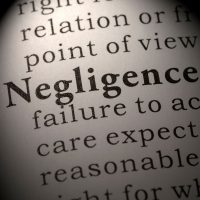Overview of Indiana Negligence Law

Negligence is the legal concept that underlies personal injury cases in Indiana. It establishes the legal framework for determining fault and liability when someone is injured due to another party’s carelessness or recklessness, such as in a car or truck accident, slip and fall, or even medical malpractice. See below for an outline of the basics of negligence law in the Hoosier State. If you’ve been hurt because of the negligence of another in Indiana, contact Lee Cossell & Feagley to explore your options with a skilled and knowledgeable Indianapolis personal injury lawyer.
What Is Negligence?
Negligence is defined as the failure to exercise the level of care that a reasonably prudent person would under similar circumstances. In the context of personal injury law, negligence occurs when this lack of care leads to an accident or injury. The concept of negligence is based on the idea that individuals have a duty to act in a way that does not harm others.
Elements of Negligence
To prove negligence in Indiana, the injured party (plaintiff) must establish four key elements:
- Duty of Care: The defendant had a legal obligation to behave in a certain way toward the plaintiff.
- Breach of Duty: The defendant failed to meet this obligation by acting or failing to act in a certain way.
- Causation: The defendant’s breach of duty directly caused the plaintiff’s injuries.
- Damages: The plaintiff suffered actual harm or losses as a result of the defendant’s actions.
Comparative Fault in Indiana
Indiana follows a modified comparative fault system, which means that an injured party can still recover damages even if they are partially at fault for their injuries. However, the amount of compensation is reduced by the percentage of the plaintiff’s fault. Importantly, if the plaintiff is found to be more than 50% at fault, they are barred from recovering any damages.
For example, if a plaintiff is awarded $100,000 in damages but is found to be 30% at fault, they would receive $70,000. If they were 51% or more at fault, they would receive nothing.
Types of Damages
In a negligence case, the plaintiff may seek various types of damages, including:
- Economic Damages: These cover quantifiable losses such as medical expenses, lost wages, and property damage.
- Non-Economic Damages: These compensate for non-quantifiable losses like pain and suffering, emotional distress, and loss of enjoyment of life.
- Punitive Damages: In rare cases, punitive damages may be awarded to punish the defendant for particularly egregious behavior and deter similar conduct in the future.
Statute of Limitations
In Indiana, there is a time limit for filing a negligence lawsuit, known as the statute of limitations. For most personal injury cases, the statute of limitations is two years from the date of the injury. Failure to file within this time frame typically results in the loss of the right to sue. The timeline can be longer or shorter than two years depending on the circumstances, so don’t delay in contacting a lawyer, but also don’t give up on an older claim without first speaking to an attorney.
Contact Lee Cossell & Feagley for Help With Your Indiana Personal Injury Claim
Negligence law plays a crucial role in personal injury cases in Indiana. Understanding the basics of this legal concept, including the elements of negligence, comparative fault rules, types of damages, and the statute of limitations, is essential for anyone seeking compensation for injuries caused by another’s carelessness. If you’ve been injured due to someone else’s negligence, it’s important to consult with an experienced personal injury attorney who can guide you through the legal process and help you secure the compensation you deserve.
At Lee Cossell & Feagley, LLP, our skilled personal injury attorneys are dedicated to helping victims of negligence in Indianapolis and throughout Indiana. Contact us today for a free consultation to discuss your case and explore your legal options.


